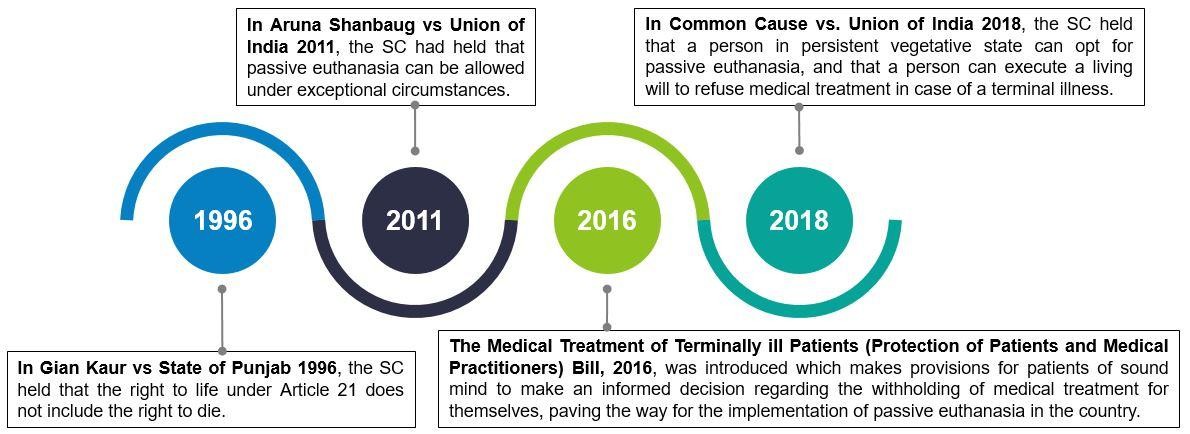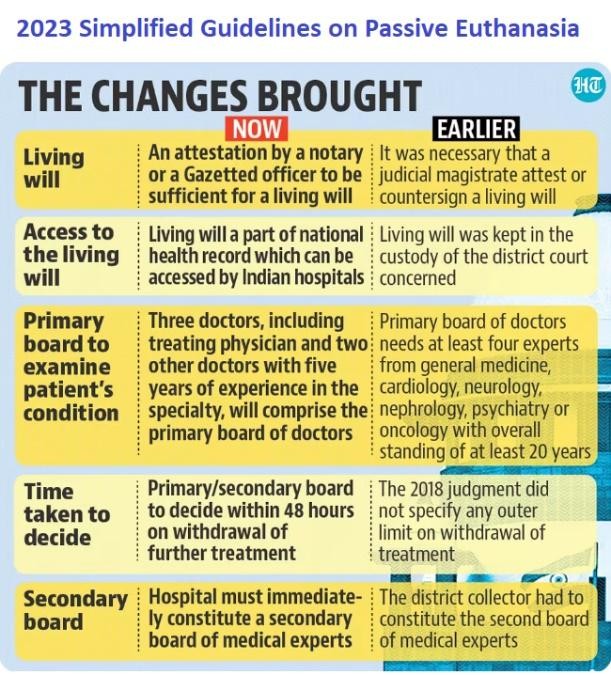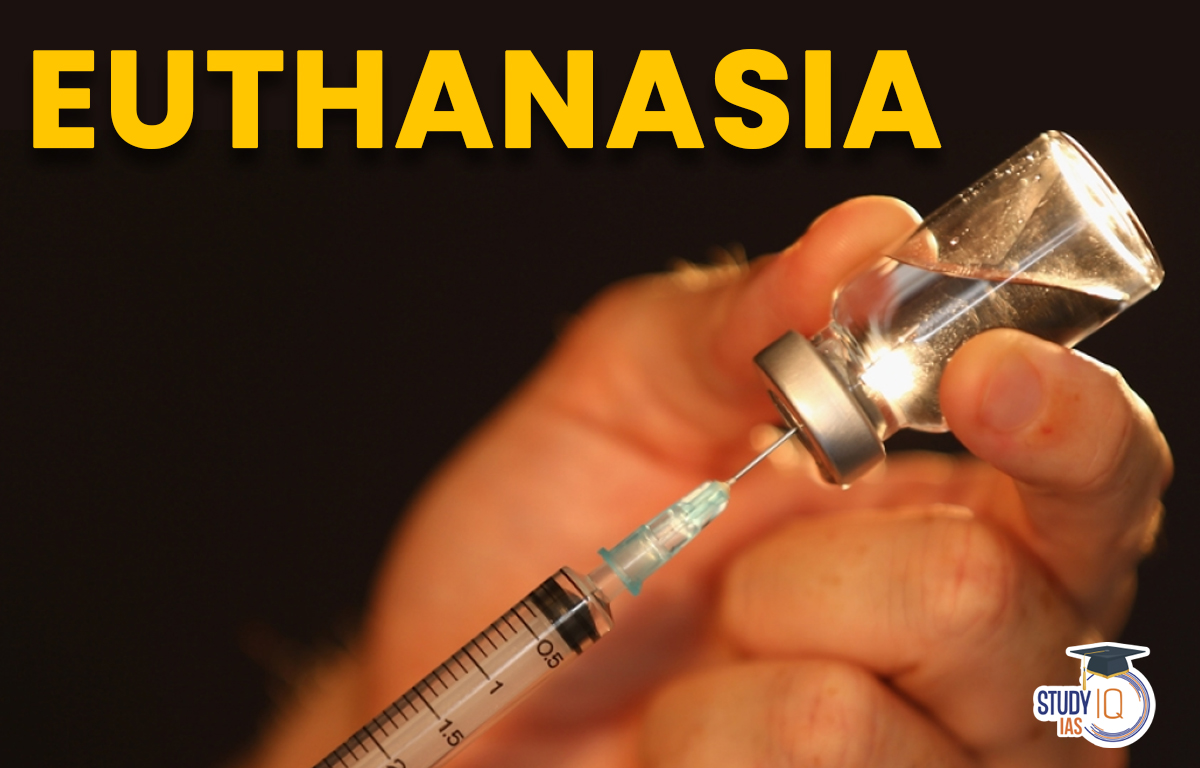Table of Contents
Context: France’s lower house of parliament adopted a bill to allow adults with incurable illness to take lethal medication.
What is Euthanasia?
- Euthanasia refers to the practice of an individual deliberately ending their life, oftentimes to get relief from an incurable condition, or intolerable pain and suffering.
- It is also known as ‘Mercy Killing’ which is an act where the individual who, is in an irremediable condition or has no chances of survival as he is suffering from painful life, painlessly ends his life.
- There are primarily two types of Euthanasia:
- Active euthanasia: refers to the physician’s deliberate act, usually the administration of lethal drugs, to end an incurably or terminally ill patient’s life.
- Passive euthanasia: refers to withholding or withdrawing treatment which is necessary for maintaining life.
Arguments for and against Euthanasia
| Arguments in Favour of legalizing euthanasia | Arguments against euthanasia |
| Article 21 provides for the right to live a life with at least a minimum dignity, and if that standard falls below that minimum level, then a person should be given the right to end their life. | Human life is the gift of God, and taking life is wrong and immoral Human beings cannot be given the right to play the part of God. |
| In countries like India, there is a lack of funds and a shortage of hospital space. So, the energy of doctors and hospital beds can be used for those people whose lives can be saved instead of continuing the life of those who want to die. | It is totally against medical ethics, morals, and public policy. Medical ethics call for nursing, caregiving, giving and healing, and not ending the life of the patient. |
| Forcing a person to live in an undignified way is against the person’s choice. Thus, it expresses the choice of a person, which is a fundamental principle. | It is feared that if euthanasia is legalised then other groups of more vulnerable people will become at risk of feeling compelled to take that option themselves. |
| It is an act of painlessly putting to death. So, the motive behind this is to help rather than harm. | Legalising it may lead to a slippery slope effect, resulting in assisted murders. |
Different Countries, Different Laws on Euthanasia
- Netherlands, Luxembourg, and Belgium allow both euthanasia and assisted suicide for anyone who faces “unbearable suffering” that has no chance of improvement.
- Switzerland bans euthanasia but allows assisted dying in the presence of a doctor or physician.
- Canada had announced that euthanasia and assisted dying would be allowed for mentally ill patients by March 2023; however, the decision has been widely criticized, and the move may be delayed.
- United States has different laws in different states. Euthanasia is allowed in some states, like Washington, Oregon, and Montana.
- United Kingdom considers it illegal and equivalent to manslaughter.
Also Read: Living Will and Passive Euthanasia
Euthanasia in India
- Active euthanasia is a crime under section 302 or 304 of IPC.
- Passive euthanasia is legal in India under exceptional circumstances. The theory of passive euthanasia got its legal status in the year 2011.

- The 2018 judgment has made it harder to give passive euthanasia effect as now it involves execution of the living will in the presence of two witnesses, authentication by a:
- Judicial Magistrate
- Permission from two Medical Boards
- Jurisdictional Collector.
- Note: A ‘living will’ is a concept where a patient can give advance consent that allows withdrawal of life support systems if the individual is reduced to a permanent vegetative state with no real chance of survival.
- Concerns with the 2018 Judgment:
- Complex and Cumbersome Process: In the five years since the judgment, no family of a terminally ill patient has benefited from it.
- Time Sensitivity of Matter: Norms did not take into account the fact that most decisions in intensive care units (ICUs) are required to be made under time pressure.
- Hospitals exploit the kin of patients financially by deliberately keeping terminally ill patients on life support, even though they are beyond any chance of recovery.
- Simplified guidelines: In January 2023, the Supreme Court of India simplified the rules on passive euthanasia in cases of terminal illness.

Suggestions
- Enact Specific Legislation: Parliament should introduce a dedicated law on Euthanasia to address the current legal gaps and provide clarity.
- Strengthen Living Will Provisions: A robust legal framework should be established to govern living wills or advance directives, detailing their format, validity, and enforceability.
- Promote Interfaith Dialogue: Open discussions within and among religious communities are essential to address differing views on Euthanasia and reduce associated stigma.
- Raise Public Awareness: Educational initiatives should be conducted to inform the general public and medical professionals about the legal status and ethical aspects of Euthanasia.
- Ensure Strong Safeguards: Strict legal safeguards, clear procedural guidelines, and rigorous ethical review mechanisms must be in place to prevent misuse and ensure Euthanasia is carried out responsibly.


 World Population Day 2025, Themes, Histo...
World Population Day 2025, Themes, Histo...
 What are Polycyclic Aromatic Hydrocarbon...
What are Polycyclic Aromatic Hydrocarbon...
 Marlin Fish: Species, Features, Appearan...
Marlin Fish: Species, Features, Appearan...





















